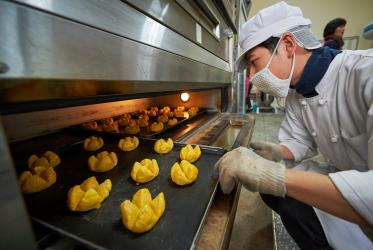Some are returning home after escaping conflict in their country several years ago. Others are Sudan citizens of the northeastern Africa country where heavy fighting between the Sudan Armed Forces and the paramilitary Rapid Support Forces has been occurring.
In Malakal, Anglican [Episcopal] Archbishop Joseph Garang Atem of the Upper Nile Internal Province in South Sudan says that thousands— probably 25,000-35,000 people—have descended on Renk at once.
“There are both returnees and refugees who have arrived due to the crisis in Sudan. The arrival has greatly affected the host community,” says Atem. “This might trigger another crisis between the people because food is not enough, water is not enough, medicine not enough, nothing is enough. It is a time for big challenges, not for the church only, but for the whole community.”
Armed violence has gripped Sudan since 15 April when disagreements between army chief Gen. Abdel Fattah al-Burhan and Rapid Support Forces leader Mohammed Hamdan Dagalo (alias Hemedti) escalated into full combat. Rough estimates indicate that at least 1,000 people had died by 16 May and over 5,000 had been injured.
According to the UN, the conflict has displaced at least 1.4 million people, with nearly 850,000 remaining inside the country and about 250,000 streaming into Egypt, Chad, and South Sudan.
An estimated 800,000 South Sudan refugees were in Sudan before the war, according to the UN Refugee Agency, but at least 46, 000 have since crossed into South Sudan.
According to church sources, many more people are stranded in the towns of Renk and Poloch.
“Many women and children are sleeping out in the open at risk from violent crime and snake bites,” says James Wani, Christian Aid South Sudan country director. “Without more solidarity, like the international community showed in Ukraine, we could be overwhelmed by the plight of all those needing the essentials of food, water, and medical help.”
Archbishop Atem explains that despite its limited capacity, the church is doing its best to welcome the returnees and refugees. He notes that in the midst of the crisis, different humanitarian organizations are preparing to respond and have carried out assessments so that they can request the support.
But for the churches, the matters are urgent and have to mount an immediate response to the needy populations.
The Anglican diocese, for example, has sold some of the sorghum, which it grows and stores for other needs, such as teachers' salaries and development projects, to support the migrants.
“So when they came, we brought out the sorghum and distributed it to the people. We have sold some of it, so that we can buy rice, lentils, and oil, and other items that we can give to them,” says the archbishop.
Atem expresses his distress at seeing refugees streaming into South Sudan because of the “senseless war.”
“Civilians have been running from South Sudan because of war, going for safety in Sudan, and then this has started in Sudan. Those who fled earlier are running back to South Sudan. For how long are we going to be running?” he queries, while reminding that a lot is being spent on the weapons.
The archbishop also keeps close contact with Archbishop Ezekiel Kondo, the primate of Sudan who he says has been separated from his wife by the war and whose church has been occupied by the fighters.








